CD reviews
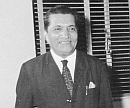 [by Ken Hunt, London] Whilst writing the essay about the history of Call of the Valley back in those days when the internet was in its infancy and before mobile phones, it took months to obtain the right phone number for G.N. Joshi – or one that worked. The way things sometimes go, I finally made direct contact only to learn that he had died days before.
[by Ken Hunt, London] Whilst writing the essay about the history of Call of the Valley back in those days when the internet was in its infancy and before mobile phones, it took months to obtain the right phone number for G.N. Joshi – or one that worked. The way things sometimes go, I finally made direct contact only to learn that he had died days before.
5. 6. 2009 |
read more...
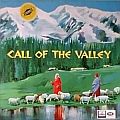 [by Ken Hunt, London] Key works that open doors to reveal unsuspected possibilities are fewer and farther between than press releases and other fictions would lead us to believe. On the basis that a little hyperbole goes a long way, glib judgements get bandied around with frightening frequency and lightning strike effect. For many people Call of the Valley opened up the skies, was a revelation. Its impact could be likened to revealing a new colour in the spectrum, for it was directly responsible for bringing Hindustani classical music – as Northern Indian classical music is known – to new audiences all around the globe. Its three soloists would go on to internationally acclaimed careers. But all that lay in the future. For countless listeners the first time they would hear the consummate musicianship of Shivkumar Sharma, Brijbushan Kabra and Hariprasad Chaurasia would be this record.
[by Ken Hunt, London] Key works that open doors to reveal unsuspected possibilities are fewer and farther between than press releases and other fictions would lead us to believe. On the basis that a little hyperbole goes a long way, glib judgements get bandied around with frightening frequency and lightning strike effect. For many people Call of the Valley opened up the skies, was a revelation. Its impact could be likened to revealing a new colour in the spectrum, for it was directly responsible for bringing Hindustani classical music – as Northern Indian classical music is known – to new audiences all around the globe. Its three soloists would go on to internationally acclaimed careers. But all that lay in the future. For countless listeners the first time they would hear the consummate musicianship of Shivkumar Sharma, Brijbushan Kabra and Hariprasad Chaurasia would be this record.
1. 6. 2009 |
read more...
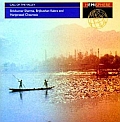 [by Ken Hunt after G.N. Joshi] Picture a hamlet, as G.N. Joshi wrote in the original sleeve notes to Call of the Valley, nestling in the shelter of a Kashmiri valley. The story begins as sunrise approaches. Guitar signals dawn’s arrival. Santoor, the very epitome of the Kashmiri soundscape, joins in to play the early morning râg Ahir Bhairav, the first movement of the suite.
[by Ken Hunt after G.N. Joshi] Picture a hamlet, as G.N. Joshi wrote in the original sleeve notes to Call of the Valley, nestling in the shelter of a Kashmiri valley. The story begins as sunrise approaches. Guitar signals dawn’s arrival. Santoor, the very epitome of the Kashmiri soundscape, joins in to play the early morning râg Ahir Bhairav, the first movement of the suite.
Swarmandal – a zither-like instrument – ripples usher in the second movement, Nat Bhairav. The day advances. The sun begins its climb with Joshi imagining Kashmir’s scenic splendour. Set to ektāl, tāl or taal meaning a rhythmic cycle, in this case one of 12 beats, the scene takes on colour and form.
1. 6. 2009 |
read more...
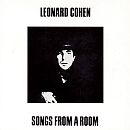 [by Ken Hunt, London] On its release Cohen’s Songs Of Leonard Cohen (1967) was more than a strained-voice recapitulation of what we already knew through Judy Collins, the song interpreter who had done so much to introduce the Canadian songwriter on her In My Life (1966) and Wildflowers (1967). Cohen’s delivery on his debut’s ten-song album was so much more world-weary, more experienced, more laconic, more droll.
[by Ken Hunt, London] On its release Cohen’s Songs Of Leonard Cohen (1967) was more than a strained-voice recapitulation of what we already knew through Judy Collins, the song interpreter who had done so much to introduce the Canadian songwriter on her In My Life (1966) and Wildflowers (1967). Cohen’s delivery on his debut’s ten-song album was so much more world-weary, more experienced, more laconic, more droll.
16. 4. 2009 |
read more...
 [by Ken Hunt, London] Lest we forget, Hungary was directly responsible for the ultimate Fall of the Berlin Wall in 1989 and, likewise, lest we forget, Hungary’s strong and vibrant folk and roots music scenes have had a huge influence on Europe’s folk and world music scenes for longer still. My first brushes with Hungarian music came through having my ears turned and recalibrated by LPs on the Soviet-era state record company Hungaroton and UK releases on Joe Boyd’s Hannibal label. Things have got continually better. With musicians of the calibre of Szilvia Bognár in the vanguard of developments and consolidations, it is no wonder that Hungary’s roots music scene is in such fine fettle. Szilvia Bognár’s Semmicske énekek is what Hungary sounds like right now and it is spectacular.
[by Ken Hunt, London] Lest we forget, Hungary was directly responsible for the ultimate Fall of the Berlin Wall in 1989 and, likewise, lest we forget, Hungary’s strong and vibrant folk and roots music scenes have had a huge influence on Europe’s folk and world music scenes for longer still. My first brushes with Hungarian music came through having my ears turned and recalibrated by LPs on the Soviet-era state record company Hungaroton and UK releases on Joe Boyd’s Hannibal label. Things have got continually better. With musicians of the calibre of Szilvia Bognár in the vanguard of developments and consolidations, it is no wonder that Hungary’s roots music scene is in such fine fettle. Szilvia Bognár’s Semmicske énekek is what Hungary sounds like right now and it is spectacular.
22. 3. 2009 |
read more...
 [by Ken Hunt, London] Thao Nguyen’s We Brave Bee Stings And All, produced by Tucker Martine (The Decemberists, Mudhoney and Sufjan Stevens), is one of those fine vehicles that hurtle down the turnpike causing the listener to do a double take or three. On a casual listening or initially you’ll get carried along with a banjo-driven song like Swimming Pools without taking in the lyrical context. But then a line like “We splash our eyes with chemicals” drops like bait.
[by Ken Hunt, London] Thao Nguyen’s We Brave Bee Stings And All, produced by Tucker Martine (The Decemberists, Mudhoney and Sufjan Stevens), is one of those fine vehicles that hurtle down the turnpike causing the listener to do a double take or three. On a casual listening or initially you’ll get carried along with a banjo-driven song like Swimming Pools without taking in the lyrical context. But then a line like “We splash our eyes with chemicals” drops like bait.
21. 2. 2008 |
read more...
 [by Ken Hunt, London] Lal Waterson, who died in September 1998 aged 55, was a founding member of the Watersons, the Hull-based folk group. Elaine, to use her proper name, was the youngest of the three siblings that eventually lent their name to one of the English Folk Revival’s most influential and utterly inimitable voice-based groups. People called her the Quiet One. And there was a sliver of truth to that. Leastways while her defences were up and she was sounding you out, getting your measure.
[by Ken Hunt, London] Lal Waterson, who died in September 1998 aged 55, was a founding member of the Watersons, the Hull-based folk group. Elaine, to use her proper name, was the youngest of the three siblings that eventually lent their name to one of the English Folk Revival’s most influential and utterly inimitable voice-based groups. People called her the Quiet One. And there was a sliver of truth to that. Leastways while her defences were up and she was sounding you out, getting your measure.
8. 10. 2007 |
read more...
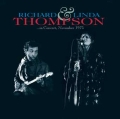 [by Ken Hunt, London] Their marital relationship hitting the buffers by the beginning of the next decade was years away when Richard and Linda Thompson made these live recordings. Hindsight of that nature adds nothing to the frissons that In Concert 1975 delivers. After all, living a year of your life in no way compares to the way a year or three gets ‘telescoped’ for the purposes of biography. And in any case between 1974 and 1982 the couple released a sequence of jointly credited duo albums that count amongst the finest to come out of Britain during the period in terms of songcraft and performance. This is them at their peak, though they were soon to duck out of this life to pursue other, non-musical paths in a Sufi community.
[by Ken Hunt, London] Their marital relationship hitting the buffers by the beginning of the next decade was years away when Richard and Linda Thompson made these live recordings. Hindsight of that nature adds nothing to the frissons that In Concert 1975 delivers. After all, living a year of your life in no way compares to the way a year or three gets ‘telescoped’ for the purposes of biography. And in any case between 1974 and 1982 the couple released a sequence of jointly credited duo albums that count amongst the finest to come out of Britain during the period in terms of songcraft and performance. This is them at their peak, though they were soon to duck out of this life to pursue other, non-musical paths in a Sufi community.
14. 9. 2007 |
read more...
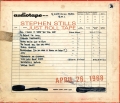 [by Ken Hunt, London] The Stephen Stills who put down this session on 26 April 1968 was hardly between jobs – even if he was between Buffalo Springfield and Crosby, Stills & Nash. On the album’s skimpy notes, Stills writes, “I was at a Judy Collins session in New York in 1968, and when she was finished, I peeled off a few hundreds for the engineer so I could make a tape of my new songs.” Which Judy Collins session? Not the Who Knows Where The Time Goes surely, because it would be churlish beyond belief not to be explicit about that.
[by Ken Hunt, London] The Stephen Stills who put down this session on 26 April 1968 was hardly between jobs – even if he was between Buffalo Springfield and Crosby, Stills & Nash. On the album’s skimpy notes, Stills writes, “I was at a Judy Collins session in New York in 1968, and when she was finished, I peeled off a few hundreds for the engineer so I could make a tape of my new songs.” Which Judy Collins session? Not the Who Knows Where The Time Goes surely, because it would be churlish beyond belief not to be explicit about that.
12. 8. 2007 |
read more...
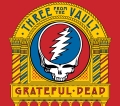 [by Ken Hunt, London] The Grateful Dead were a band that polarised opinion. How you took them over the course of their 30-year lifespan probably got entrenched. Mind you, given the band’s archival revelations, the present tense ‘take’ still seems pertinent, even all these years after their linchpin Jerry Garcia’s death in August 1995 and the band’s subsequent folding that year.
[by Ken Hunt, London] The Grateful Dead were a band that polarised opinion. How you took them over the course of their 30-year lifespan probably got entrenched. Mind you, given the band’s archival revelations, the present tense ‘take’ still seems pertinent, even all these years after their linchpin Jerry Garcia’s death in August 1995 and the band’s subsequent folding that year.
2. 7. 2007 |
read more...
« Later articles
Older articles »
 [by Ken Hunt, London] Whilst writing the essay about the history of Call of the Valley back in those days when the internet was in its infancy and before mobile phones, it took months to obtain the right phone number for G.N. Joshi – or one that worked. The way things sometimes go, I finally made direct contact only to learn that he had died days before.
[by Ken Hunt, London] Whilst writing the essay about the history of Call of the Valley back in those days when the internet was in its infancy and before mobile phones, it took months to obtain the right phone number for G.N. Joshi – or one that worked. The way things sometimes go, I finally made direct contact only to learn that he had died days before. [by Ken Hunt, London] Key works that open doors to reveal unsuspected possibilities are fewer and farther between than press releases and other fictions would lead us to believe. On the basis that a little hyperbole goes a long way, glib judgements get bandied around with frightening frequency and lightning strike effect. For many people Call of the Valley opened up the skies, was a revelation. Its impact could be likened to revealing a new colour in the spectrum, for it was directly responsible for bringing Hindustani classical music – as Northern Indian classical music is known – to new audiences all around the globe. Its three soloists would go on to internationally acclaimed careers. But all that lay in the future. For countless listeners the first time they would hear the consummate musicianship of Shivkumar Sharma, Brijbushan Kabra and Hariprasad Chaurasia would be this record.
[by Ken Hunt, London] Key works that open doors to reveal unsuspected possibilities are fewer and farther between than press releases and other fictions would lead us to believe. On the basis that a little hyperbole goes a long way, glib judgements get bandied around with frightening frequency and lightning strike effect. For many people Call of the Valley opened up the skies, was a revelation. Its impact could be likened to revealing a new colour in the spectrum, for it was directly responsible for bringing Hindustani classical music – as Northern Indian classical music is known – to new audiences all around the globe. Its three soloists would go on to internationally acclaimed careers. But all that lay in the future. For countless listeners the first time they would hear the consummate musicianship of Shivkumar Sharma, Brijbushan Kabra and Hariprasad Chaurasia would be this record. [by Ken Hunt after G.N. Joshi] Picture a hamlet, as G.N. Joshi wrote in the original sleeve notes to Call of the Valley, nestling in the shelter of a Kashmiri valley. The story begins as sunrise approaches. Guitar signals dawn’s arrival. Santoor, the very epitome of the Kashmiri soundscape, joins in to play the early morning râg Ahir Bhairav, the first movement of the suite.
[by Ken Hunt after G.N. Joshi] Picture a hamlet, as G.N. Joshi wrote in the original sleeve notes to Call of the Valley, nestling in the shelter of a Kashmiri valley. The story begins as sunrise approaches. Guitar signals dawn’s arrival. Santoor, the very epitome of the Kashmiri soundscape, joins in to play the early morning râg Ahir Bhairav, the first movement of the suite. [by Ken Hunt, London] On its release Cohen’s Songs Of Leonard Cohen (1967) was more than a strained-voice recapitulation of what we already knew through Judy Collins, the song interpreter who had done so much to introduce the Canadian songwriter on her In My Life (1966) and Wildflowers (1967). Cohen’s delivery on his debut’s ten-song album was so much more world-weary, more experienced, more laconic, more droll.
[by Ken Hunt, London] On its release Cohen’s Songs Of Leonard Cohen (1967) was more than a strained-voice recapitulation of what we already knew through Judy Collins, the song interpreter who had done so much to introduce the Canadian songwriter on her In My Life (1966) and Wildflowers (1967). Cohen’s delivery on his debut’s ten-song album was so much more world-weary, more experienced, more laconic, more droll.  [by Ken Hunt, London] Lest we forget, Hungary was directly responsible for the ultimate Fall of the Berlin Wall in 1989 and, likewise, lest we forget, Hungary’s strong and vibrant folk and roots music scenes have had a huge influence on Europe’s folk and world music scenes for longer still. My first brushes with Hungarian music came through having my ears turned and recalibrated by LPs on the Soviet-era state record company Hungaroton and UK releases on Joe Boyd’s Hannibal label. Things have got continually better. With musicians of the calibre of Szilvia Bognár in the vanguard of developments and consolidations, it is no wonder that Hungary’s roots music scene is in such fine fettle. Szilvia Bognár’s Semmicske énekek is what Hungary sounds like right now and it is spectacular.
[by Ken Hunt, London] Lest we forget, Hungary was directly responsible for the ultimate Fall of the Berlin Wall in 1989 and, likewise, lest we forget, Hungary’s strong and vibrant folk and roots music scenes have had a huge influence on Europe’s folk and world music scenes for longer still. My first brushes with Hungarian music came through having my ears turned and recalibrated by LPs on the Soviet-era state record company Hungaroton and UK releases on Joe Boyd’s Hannibal label. Things have got continually better. With musicians of the calibre of Szilvia Bognár in the vanguard of developments and consolidations, it is no wonder that Hungary’s roots music scene is in such fine fettle. Szilvia Bognár’s Semmicske énekek is what Hungary sounds like right now and it is spectacular. [by Ken Hunt, London] Thao Nguyen’s We Brave Bee Stings And All, produced by Tucker Martine (The Decemberists, Mudhoney and Sufjan Stevens), is one of those fine vehicles that hurtle down the turnpike causing the listener to do a double take or three. On a casual listening or initially you’ll get carried along with a banjo-driven song like Swimming Pools without taking in the lyrical context. But then a line like “We splash our eyes with chemicals” drops like bait.
[by Ken Hunt, London] Thao Nguyen’s We Brave Bee Stings And All, produced by Tucker Martine (The Decemberists, Mudhoney and Sufjan Stevens), is one of those fine vehicles that hurtle down the turnpike causing the listener to do a double take or three. On a casual listening or initially you’ll get carried along with a banjo-driven song like Swimming Pools without taking in the lyrical context. But then a line like “We splash our eyes with chemicals” drops like bait. [by Ken Hunt, London] Lal Waterson, who died in September 1998 aged 55, was a founding member of the Watersons, the Hull-based folk group. Elaine, to use her proper name, was the youngest of the three siblings that eventually lent their name to one of the English Folk Revival’s most influential and utterly inimitable voice-based groups. People called her the Quiet One. And there was a sliver of truth to that. Leastways while her defences were up and she was sounding you out, getting your measure.
[by Ken Hunt, London] Lal Waterson, who died in September 1998 aged 55, was a founding member of the Watersons, the Hull-based folk group. Elaine, to use her proper name, was the youngest of the three siblings that eventually lent their name to one of the English Folk Revival’s most influential and utterly inimitable voice-based groups. People called her the Quiet One. And there was a sliver of truth to that. Leastways while her defences were up and she was sounding you out, getting your measure.  [by Ken Hunt, London] Their marital relationship hitting the buffers by the beginning of the next decade was years away when Richard and Linda Thompson made these live recordings. Hindsight of that nature adds nothing to the frissons that In Concert 1975 delivers. After all, living a year of your life in no way compares to the way a year or three gets ‘telescoped’ for the purposes of biography. And in any case between 1974 and 1982 the couple released a sequence of jointly credited duo albums that count amongst the finest to come out of Britain during the period in terms of songcraft and performance. This is them at their peak, though they were soon to duck out of this life to pursue other, non-musical paths in a Sufi community.
[by Ken Hunt, London] Their marital relationship hitting the buffers by the beginning of the next decade was years away when Richard and Linda Thompson made these live recordings. Hindsight of that nature adds nothing to the frissons that In Concert 1975 delivers. After all, living a year of your life in no way compares to the way a year or three gets ‘telescoped’ for the purposes of biography. And in any case between 1974 and 1982 the couple released a sequence of jointly credited duo albums that count amongst the finest to come out of Britain during the period in terms of songcraft and performance. This is them at their peak, though they were soon to duck out of this life to pursue other, non-musical paths in a Sufi community. [by Ken Hunt, London] The Stephen Stills who put down this session on 26 April 1968 was hardly between jobs – even if he was between Buffalo Springfield and Crosby, Stills & Nash. On the album’s skimpy notes, Stills writes, “I was at a Judy Collins session in New York in 1968, and when she was finished, I peeled off a few hundreds for the engineer so I could make a tape of my new songs.” Which Judy Collins session? Not the Who Knows Where The Time Goes surely, because it would be churlish beyond belief not to be explicit about that.
[by Ken Hunt, London] The Stephen Stills who put down this session on 26 April 1968 was hardly between jobs – even if he was between Buffalo Springfield and Crosby, Stills & Nash. On the album’s skimpy notes, Stills writes, “I was at a Judy Collins session in New York in 1968, and when she was finished, I peeled off a few hundreds for the engineer so I could make a tape of my new songs.” Which Judy Collins session? Not the Who Knows Where The Time Goes surely, because it would be churlish beyond belief not to be explicit about that. [by Ken Hunt, London] The Grateful Dead were a band that polarised opinion. How you took them over the course of their 30-year lifespan probably got entrenched. Mind you, given the band’s archival revelations, the present tense ‘take’ still seems pertinent, even all these years after their linchpin Jerry Garcia’s death in August 1995 and the band’s subsequent folding that year.
[by Ken Hunt, London] The Grateful Dead were a band that polarised opinion. How you took them over the course of their 30-year lifespan probably got entrenched. Mind you, given the band’s archival revelations, the present tense ‘take’ still seems pertinent, even all these years after their linchpin Jerry Garcia’s death in August 1995 and the band’s subsequent folding that year.